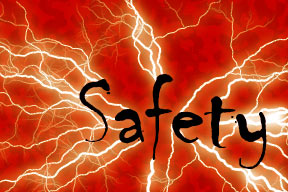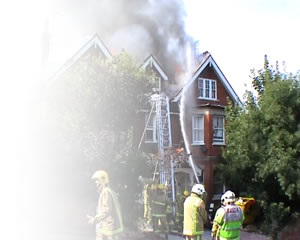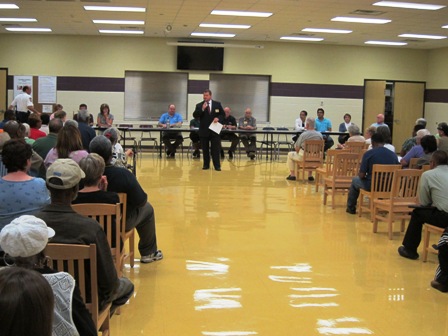
Home, sweet home! For most of us, home is the place we most like to be. Its where we unwind after a long day at the office, play with our children and spend time with our spouses. Its also the place where most of us feel the most safe and secure. Unfortunately, just because we feel safe at home, doesnt mean that we are safe at home.
Home Accident Statistics
In 2002, there were 33,300 fatalities and 8,000,000 disabling injuries that occurred in peoples homes, according to the National Safety Council (NSC). Every 16 minutes, there is a fatal injury and every 4 seconds a disabling injury in some home in the U.S. Poisonings, falls, suffocation by ingested object and suffocation or burning due to fires, flames and smoke are the leading causes of death in the home. The number one cause of death, poisoning, claimed the lives of 12,500 in 2002. This number includes deaths from drugs, medicines, other solid and liquid substances, and gases and vapors. During that same year, 8,000 people died from trauma suffered during falls in the home while 2,200 died in home fires. Following are tips from the NSC on how to lessen the risks of accidents resulting from the causes listed above:
To prevent poisonings:
- Keep personal care items are such as hair spray, cologne, perfumes, nail polish remover, nail glue remover, and astringents out of the reach of children.
- Childproof medicine cabinets.
- Be sure your home is lead safe.
- Keep items such as bleaching agents, rust removers, drain cleaners, ammonia, oven cleaners, detergents, etc. out of the reach of children.
- Never store cleaning compounds and foods together.
- Keep all substances in their original containers.

To prevent falls:
- Keep the floor clear. Reduce clutter and safely tuck telephone and electrical cords out of walkways.
- Keep the floor clean. Clean up grease, water and other liquids immediately. Don't wax floors.
- Use non-skid throw rugs to reduce your chance of slipping on linoleum.
- Install handrails in stairways. Have grab bars in the bathroom (by toilets and in tub/shower).
- Make sure living areas are well lit. We can all trip and fall in the dark.
- Be aware that climbing and reaching high places will increase your chance of a fall. Use a sturdy step stool with hand rails when these tasks are necessary.
- Follow medication dosages closely. Using medication incorrectly may lead to dizziness, weakness and other side effects. These can all lead to a dangerous fall.
To prevent suffocation by ingested object (primarily applies to infants and young children):
- Keep toys with long strings or cords away from infants and young children.
- Keep floors, tables and cabinet tops free of small objects that could be swallowed.
- Never let children of any age eat or suck on anything, such as hard candy, while lying down.
- Place an infant or child's bed away from any windows. Check window coverings for potentially hazardous pull cords.
To prevent fires and burns:
- Install smoke detectors on every level of the house, particularly outside of sleeping areas. Test detectors monthly and replace batteries twice a year.
- Keep an all-purpose fire extinguisher in your kitchen (one rated for grease fires and electrical fires).
- Keep matches, lighters and candles out of reach and out of sight of children!
- Don't ever let someone smoke in bed. Make sure that cigarettes/cigars are extinguished properly before dumping ashes.
- Avoid grease build-up in the kitchen and on appliances. Cooking fires are common. Don't leave food cooking on stovetops unattended.
- Dispose of materials from fireplaces and grills in non-flammable containers.
- Make sure your electrical system is not being over-taxed. This can cause a fire
- Inspect wires. If you find any worn or exposed wiring from appliances, discontinue their use immediately!
- Space heaters can be dangerous if not used correctly.
- Chimney fires are common. Have your chimney inspected and cleaned annually.
- Keep appliances unplugged when not in use.
Other Mishaps

Remember that there are countless other ways people hurt themselves at home such as accidentally splashing boiling water all over themselves while cooking, inadvertently dousing themselves with toxic cleaning chemicals, electrocuting themselves by using metal knives to fish toast out of electric toaster ovens, burning their fingers retrieving the roast from the oven. While its inevitable that accidents will happen in the home, by being alert and cautious, you can avoid many mishaps.
Keep Safe from Burglars and Intruders
Being safe at home also means keeping intruders out. Being vigilant about locking windows and doors is a good start. For extra precaution, you can insert pins through window frames and pieces of wood in the window tracks or sliding glass doors, making it impossible for them to be slid open from the outside. A burglar might think twice if he encounters a solid door with a double deadbolt lock. Adding motion or noise vibration sensors can help make your home more secure. There are several do-it-yourself alarms available on the market.
Installing a security alarm system or getting a guard dog will help keep people out. If you dont have the money to spend on an alarm system or have no interest in having a big, loud dog roaming around your home, studies have shown that by installing window decals and/or yard signs saying that you have a state of the alarm system with motion detectors or that Fido can smell an intruder from a mile away, you can reduce your chances of being burglarized by up to 75 percent. No would-be-intruder is going to risk finding out if your signs are truthful or not.
Its important to remember that when leaving home, especially for extended periods of time such as for vacations, you take extra precautions to ensure your home is just as safe when you return, as when you left it.
The National Burglary Convention (NBC), a nationwide nonprofit organization dedicated to educating the public on crime prevention, offers the following tips to keep intruders out of your home while out-of-town:
- Make it appear that you're home - use timers on lights, radios, and televisions.
- Keep the perimeter of your home well lighted. You can do this by installing low voltage outdoor lighting.
- Never leave clues that you are away. Ask a neighbor to collect your mail and newspapersor ask for them to be held. You may also want to ask a neighbor to park in your driveway so it appears someone is home.
- Keep some shades and blinds up and curtains open to keep a normal appearance.
- Never leave a message on your answering machine saying you are on vacation.
Conclusions
Considering that the average American spends most of his or her time at home, it seems silly to not do everything we can to ensure our homes are as safe and secure as they possibly can be.
 Print
Print Email
Email







